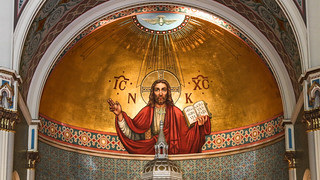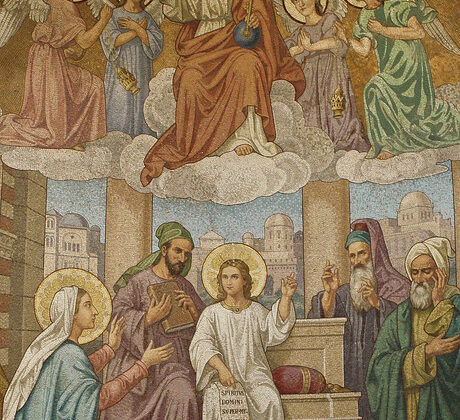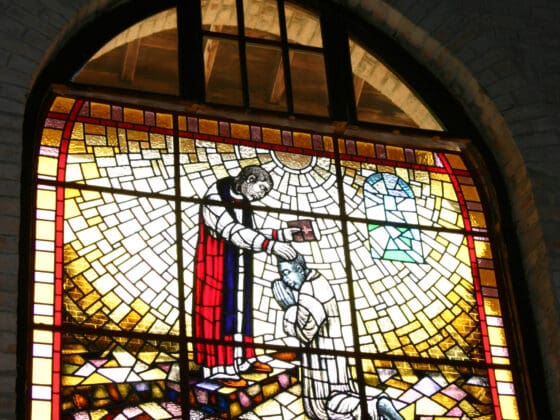A Sermon Series on the Apostles’ Creed
Sermon Preached at Redeemer Anglican Church, Bellevue
June 13, 2021
LESSONS: Psalm 114: Deuteronomy 26:5-10; 1 Corinthians 15: 1-11; Luke 1:1-4
“So we preach and so you believed.” 1 Corinthians 15:11
I am beginning a series of sermons today on the Apostles’ Creed with the title “Basic Believing,” because that is the meaning of the word Creed or Credo – “I believe.”
I am going to begin by addressing two negatives, two bad raps on the Creeds. The first objection to the Creeds is that they are about “beliefs,” dead, wooden “doctrines” about God in contrast with the pure spiritual realities of “trusting the Father God,” “walking with Jesus,” “feeling the Spirit moving in your heart.”
Many years ago, I heard a song by a group called the Camerons, titled: “The Holy Ghost will set your feet to dancing.” One stanza went like this:
Now many saints are cold and bound by unbelief today,
They want the blessings of the Lord but worry what men say,
O, let the Lord have full control, from dead traditions part,
And He will set you free within, you’ll have a dancing heart
There is an element of truth in this accusation against creeds. Knowing the Creeds as a set of answers to quiz questions about God is somewhat like knowing about the Ten Commandments and then going out breaking everyone one of them. Similarly, a confirmand can stand before the bishop and recite the Creed with crossed fingers, only to walk about of the building a committed atheist. That’s called hypocrisy, and it is not limited to creeds. I had an employee in Uganda, a member of the Miracle Church, who could pray up a storm at our staff meetings, even as he stole money out of the till. He had a dancing heart all right, along with itchy fingers.
The Creeds are somewhat like the Ten Commandments. They set the boundaries that channel genuine faith and piety, just as the Commandments channel genuine acts of love. They came into existence as various heretics challenged or distorted the biblical Gospel. And most of the ancient heresies are hardy perennials. They may pop up again with different names, but the satanic deception is always the same: not believing that Jesus Christ is the Son of God and that salvation and eternal life are found in His name alone (1 John 5:12).
Years ago, a student wag at Trinity School for Ministry referred to the candles on the Lord’s table as the landing lights on the Holy Spirit’s runway. The Articles of the Creed are something like that. So to those like the Camerons who disparage the Creeds, I say, take them for what they are: landing lights which liberate our spirits to take off in worship the true God and land safely back in reality.
The second objection to the Creeds is that they are not found in the Bible. This objection goes back to the Protestant Reformation and continues today in many free churches. The Reformers discovered the truth and power of the Word in Scripture, and they tossed out many of the traditions of the Roman Catholic Church. Some radicals among them argued that Scripture was not only sufficient for salvation but sufficient for everything. You had to find a text to brush your teeth in the morning. (Okay, I exaggerate.) This mindset led these biblicists to argue that since you could not find the word “Trinity” in the Bible, then the doctrine of the Trinity was to be rejected as some kind of false flag meant to lead believers astray. “Nothing but the Bible,” they said.
The Anglican Reformers phrased the question of Bible and doctrine more carefully. They said: “Holy Scripture contains all things necessary for salvation so that whatsoever is not read therein nor may be proved thereby is not to be required of anyone as an article of the Faith” (Article 6). First of all, they saw the main purpose of the Bible as proclaiming salvation through the death and resurrection of Jesus Christ. Other matters, like the best economic system or end of life issues might combine elements of divine revelation and practical reason. Secondly, they spoke of reading and proving a particular article of faith. From this premise, they believed that the doctrine of the Trinity could be demonstrated from various texts of the Bible, even if the word “Trinity” did not appear. In this regard, the Reformers were in agreement with the early church. The Church Fathers who authored the Creeds never doubted that their doctrine could be proved from the Bible.
It is true that the Bible has a power that the Creeds do not. Men and women have been converted reading the Bible alone. The new Anglican Archbishop of Sydney Australia, Kanishka Raffel, grew up a Buddhist from Sri Lanka who came to faith simply picking up the Gospel of John and reading it. The Creeds usually come after conversion to clarify and form the faith of new converts. And this is absolutely necessary. The New Testament and church history is full of converts who have gone astray and led others astray by half-believing the truth and cherry-picking verses of Scripture.
There is an even deeper fallacy in posing the Bible against the Creeds: the Bible itself contains Creeds! The simplest creed in the Old Testament is called the “Shema”: “Hear, O Israel: The LORD our God, the LORD is one” (Deut 6:4). This creed was Jesus’ starting point in teaching about two great Commandments (Mark 12:29).
The Shema teaches about who God is. He is the Great I AM. There is another creed in the Old Testament that speaks about what He does. This creed is embedded in a thanksgiving ritual, in the same way we recite the Creed within the service. (You’ll find it in our first reading today.)
‘A wandering Aramean was my father. And he went down into Egypt and sojourned there, few in number, and there he became a nation, great, mighty, and populous. And the Egyptians treated us harshly and humiliated us and laid on us hard labor. Then we cried to the LORD, the God of our fathers, and the LORD heard our voice and saw our affliction, our toil, and our oppression. And the LORD brought us out of Egypt with a mighty hand and an outstretched arm, with great deeds of terror, with signs and wonders. And he brought us into this place and gave us this land, a land flowing with milk and honey. (Deut 26:5-9)
This Creed is a summary of the mighty acts of God for His people: calling the patriarchs – Abraham, Isaac, and Jacob –the delivering the Israelites from Egypt and bringing them into the Promised Land.
Likewise, the New Testament has short and long creeds concerning Jesus Christ. “Jesus is Lord!” is the briefest confession of who He is. Given the fact that “Lord” (kyrios) is the word used in the Greek Bible to translate the sacred name YHWH, Christians were in effect saying from early on: “Jesus is God.” At the same time, they were not giving up the core monotheistic faith of the Old Testament, but they were moving it in a “Trinitarian” direction. Here is how St. Paul put it:
For although there may be so-called gods in heaven or on earth – as indeed there are many “gods” and many “lords” – yet for us there is one God, the Father, from whom are all things and for whom we exist, and one Lord, Jesus Christ, through whom are all things and through whom we exist. (1 Cor 8:5-6)
Paul is not making this up from whole cloth. The cloth of an early creed is already there. When he says this teaching is for us, he means this is the common teaching of all the apostles.
Just as the Old Testament talks about Who God is and What He does, the same is true of the apostolic tradition. Here is St. Paul again (our second reading today):
Now I would remind you, brothers, of the gospel I preached to you, which you received, in which you stand, and by which you are being saved, if you hold fast to the word I preached to you – unless you believed in vain. For I delivered to you as of first importance what I also received: that Christ died for our sins in accordance with the Scriptures, that he was buried, that he was raised on the third day in accordance with the Scriptures, and that he appeared to Cephas, then to the twelve. Then he appeared to more than five hundred brothers at one time, most of whom are still alive, though some have fallen asleep. Then he appeared to James, then to all the apostles. Last of all, as to one untimely born, he appeared also to me…. Whether then it was I or they, so we preach and so you believed. (1 Cor 15:1-8,11)
This passage is one of the clearest statements of the apostles’ creed in the Bible. Let’s notice several things about it. First, Paul calls it the gospel that he preached to them. This gospel is none other than the Good News of salvation, “in which you are being saved.” He goes on to say that the Corinthians “received” it, and receiving is believing, as he makes clear at the end: “so we preach and so you believed.” Paul is not talking about some abstract concept for theologians to ponder but the very heart of the Christian faith itself.
Secondly, Paul describes himself as a kind of middle-man in conveying this Gospel. He says that he delivered to them what he himself had received. The word for “receive” here means “handing over,” and handing over is of something we call tradition. So Gospel and Scripture are not at odds with tradition.
Third, what Paul is handing over is apostolic tradition, i.e., it is eyewitness testimony of those apostles who followed Jesus and witnessed his death and resurrection, many of whom were still alive when Paul writes. Paul of course describes his own encounter with Jesus on the Road to Damascus as a special belated resurrection appearance, but the Risen Lord did not communicate the content of his Gospel to him; rather, Paul received it through the other apostles.
Finally, the content which Paul gives here matches up pretty closely to the middle part of the Creeds:
- Christ died for our sins in accordance with the Scriptures,
- he was buried, and
- he was raised on the third day in accordance with the Scriptures,
So in this short passage, we learn the content of what Paul preached and taught. We also can see how he continues to teach them by reminding them. One might say that is exactly what we do when we recite the Creed in the church service. We are reminding ourselves of the truth on which we stand and by which we are saved.
The substance of the creed in Corinthians is expanded in other New Testament writings, where it is referred to as this “deposit” of faith. Here is one example, where Paul briefly summarizes the deposit for Timothy:
He was manifested in the flesh,
vindicated by the Spirit,
seen by angels,
proclaimed among the nations,
believed on in the world,
taken up in glory. (1 Tim 3:16)
Here Paul is passing on a piece of teaching that includes the “incarnation” of Christ, the role of the Holy Spirit, and Great Commission to the nations.
I am about to stop, but I want to make one more observation about the creeds in the Bible. In some churches, people sing the Creed. In fact, if you listen to recordings of the Mass, the Credo is a major section. Personally, I don’t find the particular language of the Creed easy to sing, but there is a connection between the Bible, hymns and creeds. Let’s take “Holy, holy, holy” which we sang two weeks ago on Trinity Sunday. Notice it begins with the Old Testament vision of Isaiah in the temple of the exalted one LORD of hosts. But the threefold repetition of “holy” suggests that this one Lord is more complicated than the mere number one. This one God is in three Persons, as taught by the creed.
Holy, holy, holy!
Lord God Almighty
Early in the morning
Our song shall rise to Thee.
Holy, holy, holy!
Merciful and mighty
God in three persons
Blessed Trinity!
The Holy Trinity is a great mystery awaiting further revelation, and the hymn then explains one reason: human sin.
Holy, holy, holy!
Though the darkness hide thee
Though the eye of sinful man
Thy glory may not see
Only Thou art holy
There is none beside Thee
Perfect in power, in love and purity.
In contrast with human blindness and weakness, God himself is known by his holiness: “perfect in power, in love and purity.” The third verse moves to a cosmic hymn of praise:
Holy, holy, holy!
Lord God Almighty
All thy works shall praise Thy name
In earth and sky and sea.
Holy, holy, holy!
Merciful and mighty
God in three persons
Blessed Trinity!
This final verse recalls the Book of Revelation, where the slain Lamb enters into history, revealing the Triune nature of God, and the entire creation breaks out in a hymn of praise.
This is the same message as that of the Apostles’ Creed and I shall be coming back to the Trinity next week when I begin with “I believe in God the Father, Maker of heaven and earth.”
Brothers and sisters, Creeds are not dead and wooden, unless our hearts are cold and stony. Creeds are not unbiblical, as they are embedded in the Scripture and summarize the “faith once for all delivered to the saints.
So as we spend the next weeks examining the Apostles’ Creed, line by line, let’s ingest its truth with a reverent and thankful heart and be prepared to sing, “Holy, holy, holy.”





